The Dictionary of Classical Hebrew, Volume VI Samekh–Pe
Published: Nov 2007
£150.00
The Dictionary of Classical Hebrew is a completely new and innovative dictionary.
Unlike previous dictionaries, which have been dictionaries of biblical Hebrew, this is the first dictionary of the classical Hebrew language to include the Bible, Dead Sea Scrolls, and all the other known Hebrew inscriptions and manuscripts.
This Dictionary covers the period from the earliest times to 200 CE. It lists and analyses every occurrences of each Hebrew word that occurs in texts of that period, with an English translation of every Hebrew word and phrase cited.
Among its special features are: a list of the non-biblical texts cited (especially the Dead Sea Scrolls), a word frequency index for each letter of the alphabet, a substantial bibliography (from Volume 2 onward) and an English–Hebrew index in each volume.
The Dictionary of Classical Hebrew, Volume VI Samekh–Pe
£150.00
The Dictionary of Classical Hebrew is a completely new and innovative dictionary.
Unlike previous dictionaries, which have been dictionaries of biblical Hebrew, this is the first dictionary of the classical Hebrew language to include the Bible, Dead Sea Scrolls, and all the other known Hebrew inscriptions and manuscripts.
This Dictionary covers the period from the earliest times to 200 CE. It lists and analyses every occurrences of each Hebrew word that occurs in texts of that period, with an English translation of every Hebrew word and phrase cited.
Among its special features are: a list of the non-biblical texts cited (especially the Dead Sea Scrolls), a word frequency index for each letter of the alphabet, a substantial bibliography (from Volume 2 onward) and an English–Hebrew index in each volume.
Orientalism, Assyriology and the Bible
Published: Oct 2007
Price range: £22.50 through £60.00
'Orientalism' refers both to the academic study of the Orient and to Western scholarship that clings to stock images of the timeless East and oriental despotism. This landmark collection of essays, the first in its field, is written by seasoned art historians, Assyriologists and biblical specialists; it is organized under four rubrics:
1. Intellectual and Disciplinary Histories identifies waymarks in the rise of Assyriology in America, shifting images of ancient Assyria in their cultural context, Smithsonian Institution exhibits of 'biblical antiquities' at the world's fairs of 1893 and 1895, the rise of Egyptology in the nineteenth century, Mari scholarship and its impact on biblical studies, and the ancient Near Eastern text anthology as genre (Foster, Frahm, Holloway Reid, Younger).
2. Visual Perspectives suggests itself as a corrective to the academic habit of conjuring a 'texted Orient'. Here are contributions that describe Assyrianizing engravings in the famous Dalziels' Bible Gallery, the reception of ancient Assyria in nineteenth-century England versus France, and artwork for twentieth-century American histories of Israel (Bohrer, Esposito, Long).
3. Of Harems and Heroines explores gender issues in the context of the figure of Semiramis and the idea of the harem in biblical research and Assyriology (Asher-Greve, Solvang).
4. Assyriology and the Bible offers essays that focus on specific figures (Josiah), texts (Genesis 28.10-22, the Uruk Prophecy), or periods (Persian period in biblical historiography) (Grabbe, Handy, Hurowitz, Scurlock).
The volume includes a Bibliography of some 1000 items, an important resource.
Orientalism, Assyriology and the Bible
Price range: £22.50 through £60.00
'Orientalism' refers both to the academic study of the Orient and to Western scholarship that clings to stock images of the timeless East and oriental despotism. This landmark collection of essays, the first in its field, is written by seasoned art historians, Assyriologists and biblical specialists; it is organized under four rubrics:
1. Intellectual and Disciplinary Histories identifies waymarks in the rise of Assyriology in America, shifting images of ancient Assyria in their cultural context, Smithsonian Institution exhibits of 'biblical antiquities' at the world's fairs of 1893 and 1895, the rise of Egyptology in the nineteenth century, Mari scholarship and its impact on biblical studies, and the ancient Near Eastern text anthology as genre (Foster, Frahm, Holloway Reid, Younger).
2. Visual Perspectives suggests itself as a corrective to the academic habit of conjuring a 'texted Orient'. Here are contributions that describe Assyrianizing engravings in the famous Dalziels' Bible Gallery, the reception of ancient Assyria in nineteenth-century England versus France, and artwork for twentieth-century American histories of Israel (Bohrer, Esposito, Long).
3. Of Harems and Heroines explores gender issues in the context of the figure of Semiramis and the idea of the harem in biblical research and Assyriology (Asher-Greve, Solvang).
4. Assyriology and the Bible offers essays that focus on specific figures (Josiah), texts (Genesis 28.10-22, the Uruk Prophecy), or periods (Persian period in biblical historiography) (Grabbe, Handy, Hurowitz, Scurlock).
The volume includes a Bibliography of some 1000 items, an important resource.
1 Chronicles, Second Edition
Published: Oct 2007
Price range: £15.00 through £35.00
The books of Chronicles have a certain fantasy quality about them. They create an imaginary world in which things happen just so, and in which any potentially untidy loose ends in their narrative of the past are tied together in a highly systematic way. This is storytelling with the didactic purpose of inculcating a particular ideology, bombarding the reader with a kaleidoscopic procession of heroes and villains and presenting a frontierland of danger and opportunity.
John Jarick's focus on the literary world of Chronicles provides a fresh reading of the work, foregrounding the often unrecognized artistry in the telling of the tale —including at times a distinctly musical language and a careful mathematical precision. But at the same time he does not hide the dark underbelly of the writing, with its persistent note of conformity to the political and religious system advocated by the storytellers. This edition is a reprint of the original 2002 edition with different pagination. A companion volume on 2 Chronicles is published for the first time in 2007.
1 Chronicles, Second Edition
Price range: £15.00 through £35.00
The books of Chronicles have a certain fantasy quality about them. They create an imaginary world in which things happen just so, and in which any potentially untidy loose ends in their narrative of the past are tied together in a highly systematic way. This is storytelling with the didactic purpose of inculcating a particular ideology, bombarding the reader with a kaleidoscopic procession of heroes and villains and presenting a frontierland of danger and opportunity.
John Jarick's focus on the literary world of Chronicles provides a fresh reading of the work, foregrounding the often unrecognized artistry in the telling of the tale —including at times a distinctly musical language and a careful mathematical precision. But at the same time he does not hide the dark underbelly of the writing, with its persistent note of conformity to the political and religious system advocated by the storytellers. This edition is a reprint of the original 2002 edition with different pagination. A companion volume on 2 Chronicles is published for the first time in 2007.
Identity and Interaction in the Ancient Mediterranean: Jews, Christians and Others. Essays in Honour of Stephen G. Wilson
Published: Oct 2007
£50.00
Stephen G. Wilson was Professor of Religion at Carleton University, Ottawa, and Director of the College of Humanities until his retirement in 2007. His contributions to the study of the religious identities of Jews, Christians, and Gentiles in the first three centuries of the Common Era are widely acknowledged; his interests have been no less in the contrasting and sometimes conflicting religious identities within each of these three groups.
Among his best-known publications are The Gentiles and the Gentile Mission in Luke —Acts (1973), Luke and the Law (1983), Related Strangers: Jews and Christians 70 —170 CE (1995), and Leaving the Fold: Defectors and Apostates in Antiquity (2004). The present collection of essays develops further Wilson's researches on the general theme of identity and interaction.
The sixteen contributors to this Festschrift include Kim Stratton on curse rhetoric, Adele Reinhartz on Caiaphas, Willi Braun on meals and social formation, Philip Harland on meals and social labelling, Richard Ascough on missionizing associations, John Barclay on Judaean identity in Josephus, John Kloppenborg on the recipients of the Letter of James, Laurence Broadhurst on ancient music, Larry Hurtado on manuscripts and identity, Edith Humphey on naming in the Apocalypse, Michele Murray on the Apostolic Constitutions, Roger Beck on the Late Antique 'Horoscope of Islam', Graydon Snyder on the Ethiopian Jews, Alan Segal on Daniel Boyarin, Robert Morgan on theology vs religious studies, and William Arnal on scholarly identities in the study of Christian Origins.
Identity and Interaction in the Ancient Mediterranean: Jews, Christians and Others. Essays in Honour of Stephen G. Wilson
£50.00
Stephen G. Wilson was Professor of Religion at Carleton University, Ottawa, and Director of the College of Humanities until his retirement in 2007. His contributions to the study of the religious identities of Jews, Christians, and Gentiles in the first three centuries of the Common Era are widely acknowledged; his interests have been no less in the contrasting and sometimes conflicting religious identities within each of these three groups.
Among his best-known publications are The Gentiles and the Gentile Mission in Luke —Acts (1973), Luke and the Law (1983), Related Strangers: Jews and Christians 70 —170 CE (1995), and Leaving the Fold: Defectors and Apostates in Antiquity (2004). The present collection of essays develops further Wilson's researches on the general theme of identity and interaction.
The sixteen contributors to this Festschrift include Kim Stratton on curse rhetoric, Adele Reinhartz on Caiaphas, Willi Braun on meals and social formation, Philip Harland on meals and social labelling, Richard Ascough on missionizing associations, John Barclay on Judaean identity in Josephus, John Kloppenborg on the recipients of the Letter of James, Laurence Broadhurst on ancient music, Larry Hurtado on manuscripts and identity, Edith Humphey on naming in the Apocalypse, Michele Murray on the Apostolic Constitutions, Roger Beck on the Late Antique 'Horoscope of Islam', Graydon Snyder on the Ethiopian Jews, Alan Segal on Daniel Boyarin, Robert Morgan on theology vs religious studies, and William Arnal on scholarly identities in the study of Christian Origins.
The Impartial God: Essays in Biblical Studies in Honor of Jouette M. Bassler
Published: Oct 2007
£55.00
Jouette M. Bassler, Professor of New Testament at Perkins School of Theology at Southern Methodist University since 1986, is widely recognized for contributions to Pauline studies, the Pastoral Epistles, women in the New Testament, and for her work as editor of the Journal of Biblical Literature from 1995 to 1999.
The nineteen contributions to this Festschrift include: Charles Cousar on the Christ-hymn in Philippians, Gordon Fee on the locative en in Galatians, Benjamin Fiore on kinship address in Philemon, Robert Foster on the visions of grace in Ephesians, Serge Frolov on the 'Rebellious Tenants' story as political allegory, Victor Furnish on the theology of faith, love, and hope in 1 Thessalonians, Roy Heller on widows in Deuteronomy, Robert Jewett on wrath and violence in Romans and 1 Thessalonians, Elizabeth Johnson on first-century asceticism, Ila Bovee Kraft on the fictive interlocutor in 1 Corinthians 14, Steven Kraftchick on death in Philippians, Alan Mitchell on friendship in 1 Cor. 6:8, Richard Nelson on Achsah in Judges, Jerome Neyrey on characters in the Fourth Gospel, David Rensberger on the Holy Spirit in Pauline churches, Calvin Roetzel on violent metaphorical language in 2 Corinthians, E.P. Sanders on the providence of God in Josephus and Paul, Joseph Tyson on conflicting views of leadership in Acts, and Larry Yarbrough on concern for the poor of Jerusalem.
The Impartial God: Essays in Biblical Studies in Honor of Jouette M. Bassler
£55.00
Jouette M. Bassler, Professor of New Testament at Perkins School of Theology at Southern Methodist University since 1986, is widely recognized for contributions to Pauline studies, the Pastoral Epistles, women in the New Testament, and for her work as editor of the Journal of Biblical Literature from 1995 to 1999.
The nineteen contributions to this Festschrift include: Charles Cousar on the Christ-hymn in Philippians, Gordon Fee on the locative en in Galatians, Benjamin Fiore on kinship address in Philemon, Robert Foster on the visions of grace in Ephesians, Serge Frolov on the 'Rebellious Tenants' story as political allegory, Victor Furnish on the theology of faith, love, and hope in 1 Thessalonians, Roy Heller on widows in Deuteronomy, Robert Jewett on wrath and violence in Romans and 1 Thessalonians, Elizabeth Johnson on first-century asceticism, Ila Bovee Kraft on the fictive interlocutor in 1 Corinthians 14, Steven Kraftchick on death in Philippians, Alan Mitchell on friendship in 1 Cor. 6:8, Richard Nelson on Achsah in Judges, Jerome Neyrey on characters in the Fourth Gospel, David Rensberger on the Holy Spirit in Pauline churches, Calvin Roetzel on violent metaphorical language in 2 Corinthians, E.P. Sanders on the providence of God in Josephus and Paul, Joseph Tyson on conflicting views of leadership in Acts, and Larry Yarbrough on concern for the poor of Jerusalem.
Text and Community, Vol 2: Essays in Memory of Bruce M. Metzger
Published: Oct 2007
£50.00
Bruce Manning Metzger, New Testament professor emeritus at Princeton Theological Seminary, died in February 2007 at the age of 93. This volume in his honour was already in preparation, and has become of necessity a memorial volume rather than the Festschrift that was intended.
Metzger has been called the greatest American New Testament critic and biblical translator of the twentieth century. Among his writings most commonly cited are his classic studies The Text of the New Testament, its Transmission, Corruption and Restoration (1964) and The Early Versions of the New Testament, their Origin, Transmission, and Limitations (1977). He was also Chair of the Committee of Translators for the New Revised Standard Version of the Bible (published 1990).
The first of these two wide-ranging and often innovative volumes created in his honour, subtitled Interpretation of the Text for the Community, falls into two parts: The Nature of the Bible: Manuscripts, Texts, and Translation (e.g. an ancient papyrus biblical fragment, biblical exegesis in the third world), and Understanding the Bible: Hermeneutics (e.g. biblical interpretation in Paul in its cultural context).
The second volume, on Implementation of the Text in the Community, has as its two parts, The Church and the Bible: Pulpit and Parish (e.g. pastoral care and the Bible) and The Academy, Science, Culture, Society, and the Bible (e.g. psychological method and the historical Jesus, Jungian and Freudian perspectives on gender in the Gospel of John).
Text and Community, Vol 2: Essays in Memory of Bruce M. Metzger
£50.00
Bruce Manning Metzger, New Testament professor emeritus at Princeton Theological Seminary, died in February 2007 at the age of 93. This volume in his honour was already in preparation, and has become of necessity a memorial volume rather than the Festschrift that was intended.
Metzger has been called the greatest American New Testament critic and biblical translator of the twentieth century. Among his writings most commonly cited are his classic studies The Text of the New Testament, its Transmission, Corruption and Restoration (1964) and The Early Versions of the New Testament, their Origin, Transmission, and Limitations (1977). He was also Chair of the Committee of Translators for the New Revised Standard Version of the Bible (published 1990).
The first of these two wide-ranging and often innovative volumes created in his honour, subtitled Interpretation of the Text for the Community, falls into two parts: The Nature of the Bible: Manuscripts, Texts, and Translation (e.g. an ancient papyrus biblical fragment, biblical exegesis in the third world), and Understanding the Bible: Hermeneutics (e.g. biblical interpretation in Paul in its cultural context).
The second volume, on Implementation of the Text in the Community, has as its two parts, The Church and the Bible: Pulpit and Parish (e.g. pastoral care and the Bible) and The Academy, Science, Culture, Society, and the Bible (e.g. psychological method and the historical Jesus, Jungian and Freudian perspectives on gender in the Gospel of John).
Judges
Published: Oct 2007
Price range: £15.00 through £35.00
In this new contribution to the Readings series of commentaries, Roger Ryan offers a challenge to the fashionable disdain for the heroes of the Book of Judges. As against the current consensus majoring on the supposed flaws in the characters of the judges, and denigrating them as participants in Israel's moral and religious decline, he paints a positive portrait of each of the book's judge-deliverers.
The key element in all the stories of the judges is that each of them wins independence for oppressed Israelites against great odds —an element that should predispose readers to a favourable evaluation of the heroes. Ehud slaughters an enemy king when the only weapon he has is a homemade dagger. Barak resolutely charges downhill against enemy chariots reinforced with iron. Jael slaughters an enemy commander by improvising with a hammer and a tent peg. Gideon defeats hordes of nomadic invaders with a small token army. The lone hero Samson slaughters the Philistine foe in great numbers.
The Book of Judges presents in this reading a dark story-world in which its characters take heroic risks as they resolve conflicts by violent means. Their stories are jubilantly told and readers are expected to be neither squeamish nor censorious.
Judges
Price range: £15.00 through £35.00
In this new contribution to the Readings series of commentaries, Roger Ryan offers a challenge to the fashionable disdain for the heroes of the Book of Judges. As against the current consensus majoring on the supposed flaws in the characters of the judges, and denigrating them as participants in Israel's moral and religious decline, he paints a positive portrait of each of the book's judge-deliverers.
The key element in all the stories of the judges is that each of them wins independence for oppressed Israelites against great odds —an element that should predispose readers to a favourable evaluation of the heroes. Ehud slaughters an enemy king when the only weapon he has is a homemade dagger. Barak resolutely charges downhill against enemy chariots reinforced with iron. Jael slaughters an enemy commander by improvising with a hammer and a tent peg. Gideon defeats hordes of nomadic invaders with a small token army. The lone hero Samson slaughters the Philistine foe in great numbers.
The Book of Judges presents in this reading a dark story-world in which its characters take heroic risks as they resolve conflicts by violent means. Their stories are jubilantly told and readers are expected to be neither squeamish nor censorious.
New Seals and Inscriptions, Hebrew, Idumean and Cuneiform
Published: Sep 2007
£55.00
This collection of 16 papers is a significant addition to our textual evidence for the world of the Bible: it presents over 50 inscriptions, tablets and seals from the collections of Shlomo Moussaieff, in Hebrew, Idumean, and cuneiform. Most of these texts are being published here for the first time.
New Seals and Inscriptions, Hebrew, Idumean and Cuneiform
£55.00
This collection of 16 papers is a significant addition to our textual evidence for the world of the Bible: it presents over 50 inscriptions, tablets and seals from the collections of Shlomo Moussaieff, in Hebrew, Idumean, and cuneiform. Most of these texts are being published here for the first time.
The Birth of Moses and the Buddha: A Paradigm for the Comparative Study of Religions
Published: Aug 2007
£50.00
Responding to a recent upsurge of Jewish interest in Buddhism, Sasson undertakes the first serious academic effort to uncover the common ground between the founders of the two religions, Moses and the Buddha.
Because this is a study of traditions rather than a historical investigation, Sasson is able to synthesize various kinds of materials, from biblical and non-biblical, adn from early Pali and Sanskrit Buddhist sources. She notes the striking similarities between the life-patterns of the two leaders. Both were raised as princes and both eventually left their lavish upbringings only to discover something higher. Their mothers play prominent roles in the narratives of their births, while their fathers are often excluded from view. They were both born surrounded by light and embodying miraculous qualities.
But there are also some rather consequential differences, which allow these two colossal figures to maintain their uniqueness and significance. Moses was a man chosen for a particular mission by a higher power, a human being serving as the deity's tool. By contrast, the Buddha was a man whose mission was self-determined and actualized over time. Moses lived one life; the Buddha lived many. The Buddha became the symbol of human perfection; Moses was cherished by his tradition despite — or possibly because of — his personal failings. And although Moses is often presented as the founder of Israelite religion, the Buddha was simply following the blueprint outlined by the Buddhas before him.
The programme of this study goes further than to compare and contrast the two figures. Sasson argues that the comparative model she adopts can highlight doctrines and priorities of a religion that may otherwise remain hidden. In that way, the birth of Moses and the Buddha may serve as a paradigm for the comparative study of religions.
The Birth of Moses and the Buddha: A Paradigm for the Comparative Study of Religions
£50.00
Responding to a recent upsurge of Jewish interest in Buddhism, Sasson undertakes the first serious academic effort to uncover the common ground between the founders of the two religions, Moses and the Buddha.
Because this is a study of traditions rather than a historical investigation, Sasson is able to synthesize various kinds of materials, from biblical and non-biblical, adn from early Pali and Sanskrit Buddhist sources. She notes the striking similarities between the life-patterns of the two leaders. Both were raised as princes and both eventually left their lavish upbringings only to discover something higher. Their mothers play prominent roles in the narratives of their births, while their fathers are often excluded from view. They were both born surrounded by light and embodying miraculous qualities.
But there are also some rather consequential differences, which allow these two colossal figures to maintain their uniqueness and significance. Moses was a man chosen for a particular mission by a higher power, a human being serving as the deity's tool. By contrast, the Buddha was a man whose mission was self-determined and actualized over time. Moses lived one life; the Buddha lived many. The Buddha became the symbol of human perfection; Moses was cherished by his tradition despite — or possibly because of — his personal failings. And although Moses is often presented as the founder of Israelite religion, the Buddha was simply following the blueprint outlined by the Buddhas before him.
The programme of this study goes further than to compare and contrast the two figures. Sasson argues that the comparative model she adopts can highlight doctrines and priorities of a religion that may otherwise remain hidden. In that way, the birth of Moses and the Buddha may serve as a paradigm for the comparative study of religions.
Incarnate Word, Inscribed Flesh: John’s Prologue and the Postmodern
Published: Aug 2007
£50.00
The pre-existent, transcendent Logos, the principal character in the prologue of John's Gospel, is a prime example of a unified and centred concept, such as denounced as illusory by deconstruction. In this ground-breaking study, Nutu offers an unremittingly postmodern scrutiny of the Logos as the incarnate word that becomes visible as it is inscribed in human flesh. Within view also is the reverse process, of becoming 'children of God', which signifies human beings willingly accepting God's word, his tattoo, upon their flesh in order to pertain to the realm of the Logos.
A second strand of this book is Nutu's tracing the fragmented afterlives of John's Prologue and their different effects on the formation of subjects (with a particular focus on homo religiosus and feminine 'I's) through postmodern film. At the dawn of a new millennium, films continue to play an important role in the cultural development of society; even moving away from the self-confessed biblical films, new productions like The Pillow Book, The Fifth Element and The Matrix (all engaged here) mediate elements of biblical narrative, theology, allegory, ethics and identity.
As the Bible continues its influence on society and the formation of subject positions, biblical texts are re-interpreted, recycled within many discourses. This is a study that skilfully interweaves a number of contemporary theoretical currents such as deconstruction, psychoanalytical criticism, gender and cultural studies and initiates a new approach to interpretation, namely postcommunist, influenced by the writer's own experience of growing up in Romania.
Incarnate Word, Inscribed Flesh: John’s Prologue and the Postmodern
£50.00
The pre-existent, transcendent Logos, the principal character in the prologue of John's Gospel, is a prime example of a unified and centred concept, such as denounced as illusory by deconstruction. In this ground-breaking study, Nutu offers an unremittingly postmodern scrutiny of the Logos as the incarnate word that becomes visible as it is inscribed in human flesh. Within view also is the reverse process, of becoming 'children of God', which signifies human beings willingly accepting God's word, his tattoo, upon their flesh in order to pertain to the realm of the Logos.
A second strand of this book is Nutu's tracing the fragmented afterlives of John's Prologue and their different effects on the formation of subjects (with a particular focus on homo religiosus and feminine 'I's) through postmodern film. At the dawn of a new millennium, films continue to play an important role in the cultural development of society; even moving away from the self-confessed biblical films, new productions like The Pillow Book, The Fifth Element and The Matrix (all engaged here) mediate elements of biblical narrative, theology, allegory, ethics and identity.
As the Bible continues its influence on society and the formation of subject positions, biblical texts are re-interpreted, recycled within many discourses. This is a study that skilfully interweaves a number of contemporary theoretical currents such as deconstruction, psychoanalytical criticism, gender and cultural studies and initiates a new approach to interpretation, namely postcommunist, influenced by the writer's own experience of growing up in Romania.
Qoheleth, Second Edition
Published: May 2007
Price range: £15.00 through £35.00
Qoheleth's driving question, according to Ogden, is posed in the opening lines of his book. It is the question, What lasting advantage (yithron) results from the multitude of activities in which humans find themselves engaged? In a word, the answer is, None; but the supplementary question remains, How shall we then live?
Qoheleth is no pessimist. Even though he believes that nothing survives from the activities of life, he encourages his readers to live life to the full, to 'eat, drink and enjoy what God provides'. Wisdom is one of those enjoyable benefits of life, but even it has its limitations: it can never produce an understanding of the totality.
What of the classic term hebel (traditionally translated 'vanity') in Qoheleth's thought? It is much better understood, argues Ogden, as 'enigma' or 'mystery', and the mystery it points to is the mystery of the yithron: how is joy the proper goal of human life when we know it must inevitably come to an end without leaving any surplus?
Qoheleth, Second Edition
Price range: £15.00 through £35.00
Qoheleth's driving question, according to Ogden, is posed in the opening lines of his book. It is the question, What lasting advantage (yithron) results from the multitude of activities in which humans find themselves engaged? In a word, the answer is, None; but the supplementary question remains, How shall we then live?
Qoheleth is no pessimist. Even though he believes that nothing survives from the activities of life, he encourages his readers to live life to the full, to 'eat, drink and enjoy what God provides'. Wisdom is one of those enjoyable benefits of life, but even it has its limitations: it can never produce an understanding of the totality.
What of the classic term hebel (traditionally translated 'vanity') in Qoheleth's thought? It is much better understood, argues Ogden, as 'enigma' or 'mystery', and the mystery it points to is the mystery of the yithron: how is joy the proper goal of human life when we know it must inevitably come to an end without leaving any surplus?
The Performed Bible: The Story of Ruth in Opera and Oratorio
Published: Apr 2007
£40.00
The Bible and Western culture is a burgeoning area of interest in recent scholarship, but comparatively little has been written on the Bible and music. Leneman's is a groundbreaking work, making some pioneering forays across an important interdisciplinary divide.
The Performed Bible is an in-depth study of the librettos and music of 12 operas and oratorios on the story of Ruth from the last two centuries, establishing the potential of music, as a kind of midrash, for transforming a Bible text, its narrative and its characterization. The book includes detailed analyses of musical segments, the author being a cantor and professional musician in whose Jewish tradition biblical texts are chanted, not read.
This fresh and insightful work will no doubt prove attractive to biblical scholars, to musicians and to music lovers generally.
The Performed Bible: The Story of Ruth in Opera and Oratorio
£40.00
The Bible and Western culture is a burgeoning area of interest in recent scholarship, but comparatively little has been written on the Bible and music. Leneman's is a groundbreaking work, making some pioneering forays across an important interdisciplinary divide.
The Performed Bible is an in-depth study of the librettos and music of 12 operas and oratorios on the story of Ruth from the last two centuries, establishing the potential of music, as a kind of midrash, for transforming a Bible text, its narrative and its characterization. The book includes detailed analyses of musical segments, the author being a cantor and professional musician in whose Jewish tradition biblical texts are chanted, not read.
This fresh and insightful work will no doubt prove attractive to biblical scholars, to musicians and to music lovers generally.
What Must I Do to Be Saved? Paul Parts Company with His Jewish Heritage
Published: Apr 2007
£50.00
How can one escape God's wrath and gain eternal life? On this crucial theological question, Paul differs from other members of the second-Temple Jewish community. Their soteriology is synergistic: for them, though eschatological salvation is due to God's merciful removal of human guilt, obedience to the Law is also indispensable. The divine and the human co-operate.
Paul however believes that under such a scheme anything less than perfect obedience to the Law is futile. In consequence, if there is to be salvation for sinful humans, it must be a salvation independent of all human effort and achievement, and thus solely through faith. Contrary to the recent consensus, Paul's concern was not primarily the inclusion of gentiles into the church.
This non-synergistic soteriology of Paul's may seem undermined by some of his own statements, that believers must submit to eschatological judgment and that the person without good works will be disqualified from eschatological salvation. But this conclusion is incorrect. For what he holds is that the good works indispensable for salvation are necessarily performed by the believer as manifestations of the indwelling Spirit present in those who have faith in Christ.
What Must I Do to Be Saved? Paul Parts Company with His Jewish Heritage
£50.00
How can one escape God's wrath and gain eternal life? On this crucial theological question, Paul differs from other members of the second-Temple Jewish community. Their soteriology is synergistic: for them, though eschatological salvation is due to God's merciful removal of human guilt, obedience to the Law is also indispensable. The divine and the human co-operate.
Paul however believes that under such a scheme anything less than perfect obedience to the Law is futile. In consequence, if there is to be salvation for sinful humans, it must be a salvation independent of all human effort and achievement, and thus solely through faith. Contrary to the recent consensus, Paul's concern was not primarily the inclusion of gentiles into the church.
This non-synergistic soteriology of Paul's may seem undermined by some of his own statements, that believers must submit to eschatological judgment and that the person without good works will be disqualified from eschatological salvation. But this conclusion is incorrect. For what he holds is that the good works indispensable for salvation are necessarily performed by the believer as manifestations of the indwelling Spirit present in those who have faith in Christ.
Works of the Law at Qumran and in Paul
Published: Mar 2007
£60.00
The phrase 'works of the law' occurs only in the Dead Sea Scrolls and in Paul, but it has a different connotation in each corpus.
At Qumran, the 'works of the law' are deeds of obedience to God's law, and are ultimately inspired by God. They function as a means of atonement, whether for the individual who performs them or for the sins of others.
For Paul, on the other hand, the 'works of the law' are quintessentially the works of Abraham. Though they are indeed good deeds, Abraham himself was a sinful man, and so his deeds could not make atonement for himself or for others. In fact, Paul is reacting against the idea of Abraham as a redeemer figure that was held by some of his contemporaries.
The phrase 'works of the law' thus takes on a negative coloration in Paul, as a deceptively false means of salvation. In contrast to Qumran, Paul's position is that justification must be effected 'apart from works of the law', and thus by Jesus Christ. Abraham is no 'second Adam', as some were thinking, and his good deeds, epitomized in his sacrifice of Isaac, had no atoning value.
This closely reasoned study makes an important contribution to the study of New Testament theology; it undertakes to settle some long-standing debates about Paul's soteriology by proposing an alternative both to traditional interpretation of Paul and to the 'New Perspective on Paul'.
Works of the Law at Qumran and in Paul
£60.00
The phrase 'works of the law' occurs only in the Dead Sea Scrolls and in Paul, but it has a different connotation in each corpus.
At Qumran, the 'works of the law' are deeds of obedience to God's law, and are ultimately inspired by God. They function as a means of atonement, whether for the individual who performs them or for the sins of others.
For Paul, on the other hand, the 'works of the law' are quintessentially the works of Abraham. Though they are indeed good deeds, Abraham himself was a sinful man, and so his deeds could not make atonement for himself or for others. In fact, Paul is reacting against the idea of Abraham as a redeemer figure that was held by some of his contemporaries.
The phrase 'works of the law' thus takes on a negative coloration in Paul, as a deceptively false means of salvation. In contrast to Qumran, Paul's position is that justification must be effected 'apart from works of the law', and thus by Jesus Christ. Abraham is no 'second Adam', as some were thinking, and his good deeds, epitomized in his sacrifice of Isaac, had no atoning value.
This closely reasoned study makes an important contribution to the study of New Testament theology; it undertakes to settle some long-standing debates about Paul's soteriology by proposing an alternative both to traditional interpretation of Paul and to the 'New Perspective on Paul'.
Journal of Greco-Roman Christianity and Judaism 3 (2006)
Published: Feb 2007
£80.00
This is the third volume of the hard-copy edition of a journal that has been published online (www.macdiv.ca/jgrchj) since 2000. Volume 1 was for 2000, Volume 2 was for 2001-2005, and Volume 3 is for 2006. As they appear, the hardcopy editions will replace the online materials. The scope of JGRChJ is the texts, language and cultures of the Graeco-Roman world of early Christianity and Judaism.The papers published in JGRChJ are designed to pay special attention to the 'larger picture' of politics, culture, religion and language,engaging as well with modern theoretical approaches.
Journal of Greco-Roman Christianity and Judaism 3 (2006)
£80.00
This is the third volume of the hard-copy edition of a journal that has been published online (www.macdiv.ca/jgrchj) since 2000. Volume 1 was for 2000, Volume 2 was for 2001-2005, and Volume 3 is for 2006. As they appear, the hardcopy editions will replace the online materials. The scope of JGRChJ is the texts, language and cultures of the Graeco-Roman world of early Christianity and Judaism.The papers published in JGRChJ are designed to pay special attention to the 'larger picture' of politics, culture, religion and language,engaging as well with modern theoretical approaches.
Protest Against God: The Eclipse of a Biblical Tradition
Published: Jan 2007
Price range: £15.00 through £50.00
The Hebrew Bible contains many examples of protest or complaint against God. There are classic cases in the psalms of individual lament, but we find the same attitude in community complaint psalms, in the prophetic challenges to God, and in the Book of Job.
And yet, after the exile, the complaint tradition was largely suppressed or marginalized. In this imaginative book, Morrow asks the unheard of question, Why? A shift in the religious imagination of early Judaism had taken place, he argues, spearheaded by the psychology of trauma and by international politics. A magnification of divine transcendence downgraded the intercessory role of the prophet, controlled the raw pain of exile (Lamentations, Second Isaiah), and led to intransigent refusal of the logic of lament (the friends and Yahweh in Job). The theology of complaint was eventually overshadowed by the piety of penitence and praise (the Dead Sea Scrolls).
Modern readers of the Hebrew Bible are not obliged to assent to the loss of lament, nevertheless. Ours is an age when the potency of the biblical complaints against God is being newly appropriated. Although the transcendental imagination of Western culture itself is moving into eclipse, a heightened individual consciousness has emerged. There may still be life, therefore, in the ancient prayer pattern of arguing with God, which assumes that worshippers have rights with God as well as duties, that the Creator has obligations to the creation as well as prerogatives.
This stylish intellectual history will be welcomed for its scope, its panache and its theological engagement. Awarded the 2007 R.B.Y. Scott Book Award for an outstanding book in the areas of Hebrew Bible and/or the Ancient Near East written by a member of the Canadian Society of Biblical Studies.
Protest Against God: The Eclipse of a Biblical Tradition
Price range: £15.00 through £50.00
The Hebrew Bible contains many examples of protest or complaint against God. There are classic cases in the psalms of individual lament, but we find the same attitude in community complaint psalms, in the prophetic challenges to God, and in the Book of Job.
And yet, after the exile, the complaint tradition was largely suppressed or marginalized. In this imaginative book, Morrow asks the unheard of question, Why? A shift in the religious imagination of early Judaism had taken place, he argues, spearheaded by the psychology of trauma and by international politics. A magnification of divine transcendence downgraded the intercessory role of the prophet, controlled the raw pain of exile (Lamentations, Second Isaiah), and led to intransigent refusal of the logic of lament (the friends and Yahweh in Job). The theology of complaint was eventually overshadowed by the piety of penitence and praise (the Dead Sea Scrolls).
Modern readers of the Hebrew Bible are not obliged to assent to the loss of lament, nevertheless. Ours is an age when the potency of the biblical complaints against God is being newly appropriated. Although the transcendental imagination of Western culture itself is moving into eclipse, a heightened individual consciousness has emerged. There may still be life, therefore, in the ancient prayer pattern of arguing with God, which assumes that worshippers have rights with God as well as duties, that the Creator has obligations to the creation as well as prerogatives.
This stylish intellectual history will be welcomed for its scope, its panache and its theological engagement. Awarded the 2007 R.B.Y. Scott Book Award for an outstanding book in the areas of Hebrew Bible and/or the Ancient Near East written by a member of the Canadian Society of Biblical Studies.
Text and Community, Vol. 1: Essays in Memory of Bruce M. Metzger
Published: Jan 2007
£50.00
Bruce Manning Metzger, New Testament professor emeritus at Princeton Theological Seminary, died in February 2007 at the age of 93. This volume in his honour was already in preparation, and has become of necessity a memorial volume rather than the Festschrift that was intended.
Metzger has been called the greatest American New Testament critic and biblical translator of the twentieth century. Among his writings most commonly cited are his classic studies The Text of the New Testament, its Transmission, Corruption and Restoration (1964) and The Early Versions of the New Testament, their Origin, Transmission, and Limitations (1977). He was also Chair of the Committee of Translators for the New Revised Standard Version of the Bible (published 1990).
The first of these two wide-ranging and often innovative volumes created in his honour, subtitled Interpretation of the Text for the Community, falls into two parts: The Nature of the Bible: Manuscripts, Texts, and Translation (e.g. an ancient papyrus biblical fragment, biblical exegesis in the third world), and Understanding the Bible: Hermeneutics (e.g. biblical interpretation in Paul in its cultural context).
The second volume, on Implementation of the Text in the Community, has as its two parts, The Church and the Bible: Pulpit and Parish (e.g. pastoral care and the Bible) and The Academy, Science, Culture, Society, and the Bible (e.g. psychological method and the historical Jesus, Jungian and Freudian perspectives on gender in the Gospel of John).
Text and Community, Vol. 1: Essays in Memory of Bruce M. Metzger
£50.00
Bruce Manning Metzger, New Testament professor emeritus at Princeton Theological Seminary, died in February 2007 at the age of 93. This volume in his honour was already in preparation, and has become of necessity a memorial volume rather than the Festschrift that was intended.
Metzger has been called the greatest American New Testament critic and biblical translator of the twentieth century. Among his writings most commonly cited are his classic studies The Text of the New Testament, its Transmission, Corruption and Restoration (1964) and The Early Versions of the New Testament, their Origin, Transmission, and Limitations (1977). He was also Chair of the Committee of Translators for the New Revised Standard Version of the Bible (published 1990).
The first of these two wide-ranging and often innovative volumes created in his honour, subtitled Interpretation of the Text for the Community, falls into two parts: The Nature of the Bible: Manuscripts, Texts, and Translation (e.g. an ancient papyrus biblical fragment, biblical exegesis in the third world), and Understanding the Bible: Hermeneutics (e.g. biblical interpretation in Paul in its cultural context).
The second volume, on Implementation of the Text in the Community, has as its two parts, The Church and the Bible: Pulpit and Parish (e.g. pastoral care and the Bible) and The Academy, Science, Culture, Society, and the Bible (e.g. psychological method and the historical Jesus, Jungian and Freudian perspectives on gender in the Gospel of John).

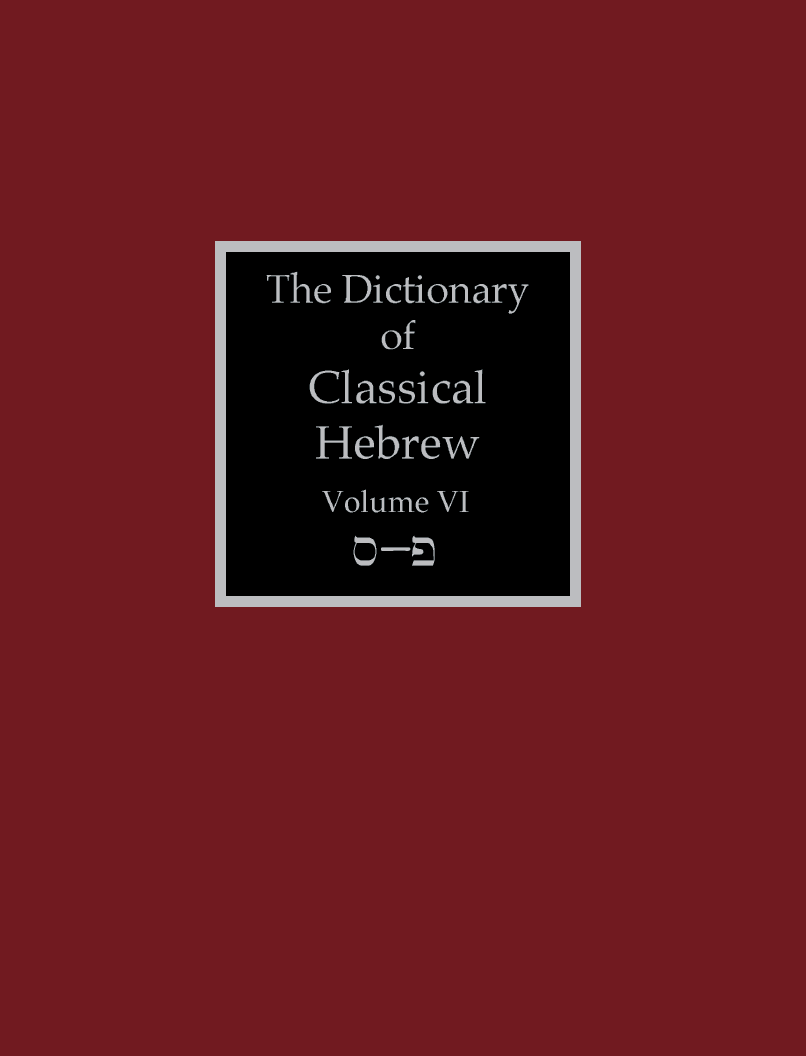
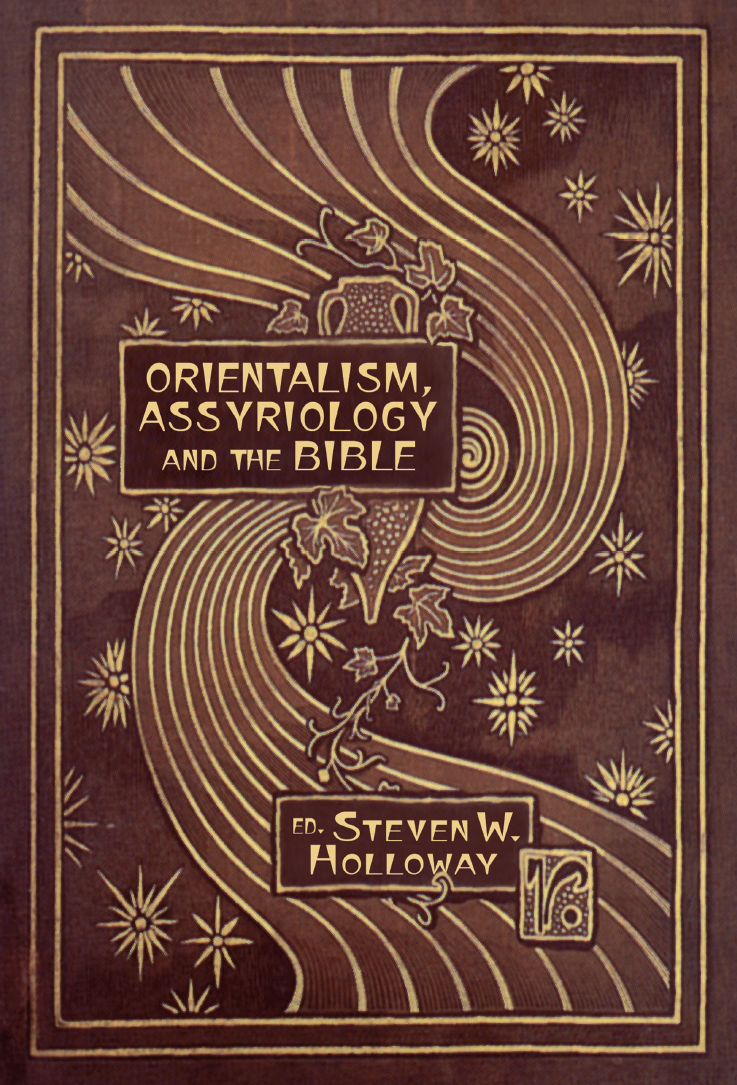
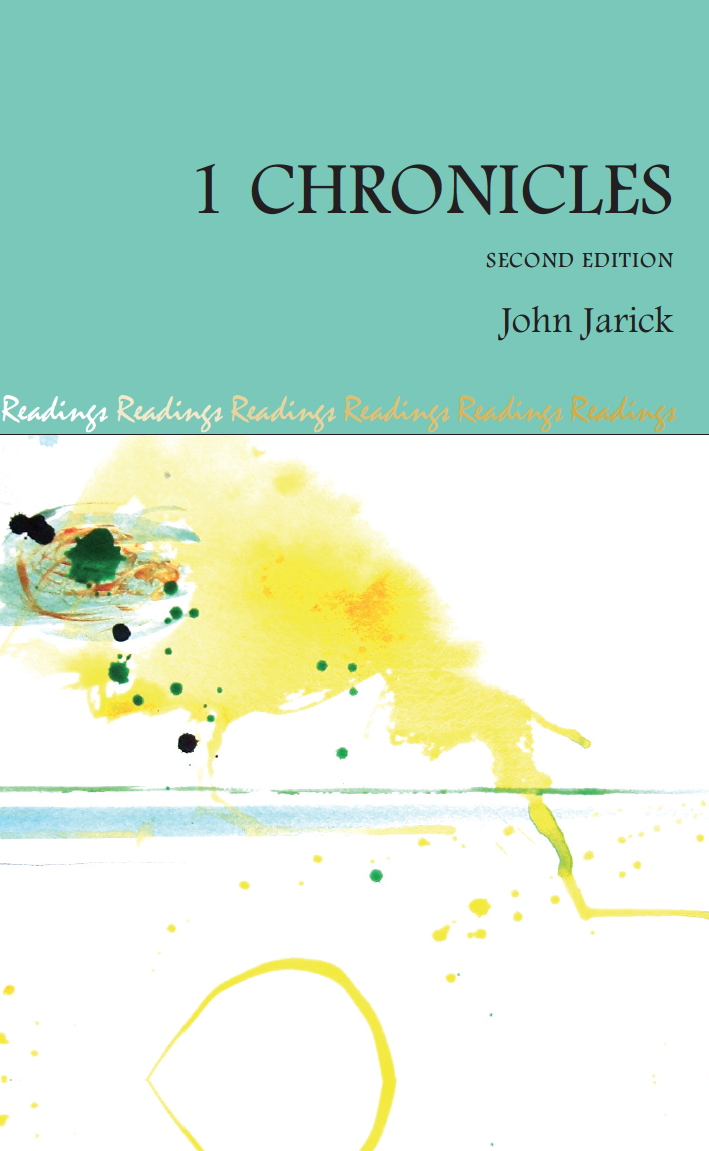

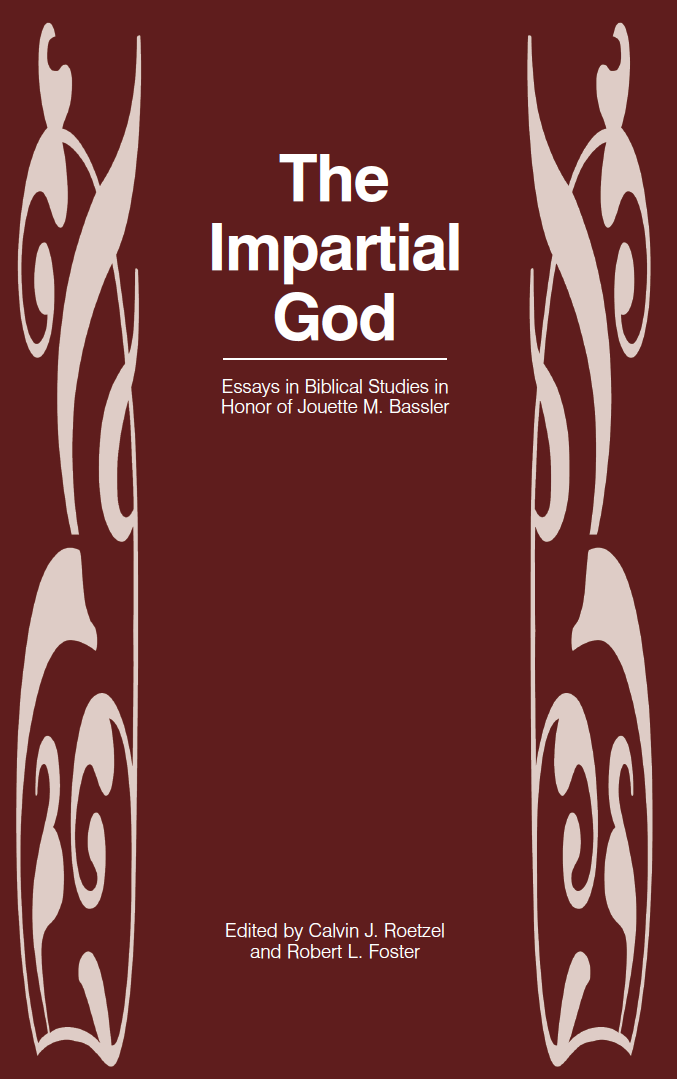
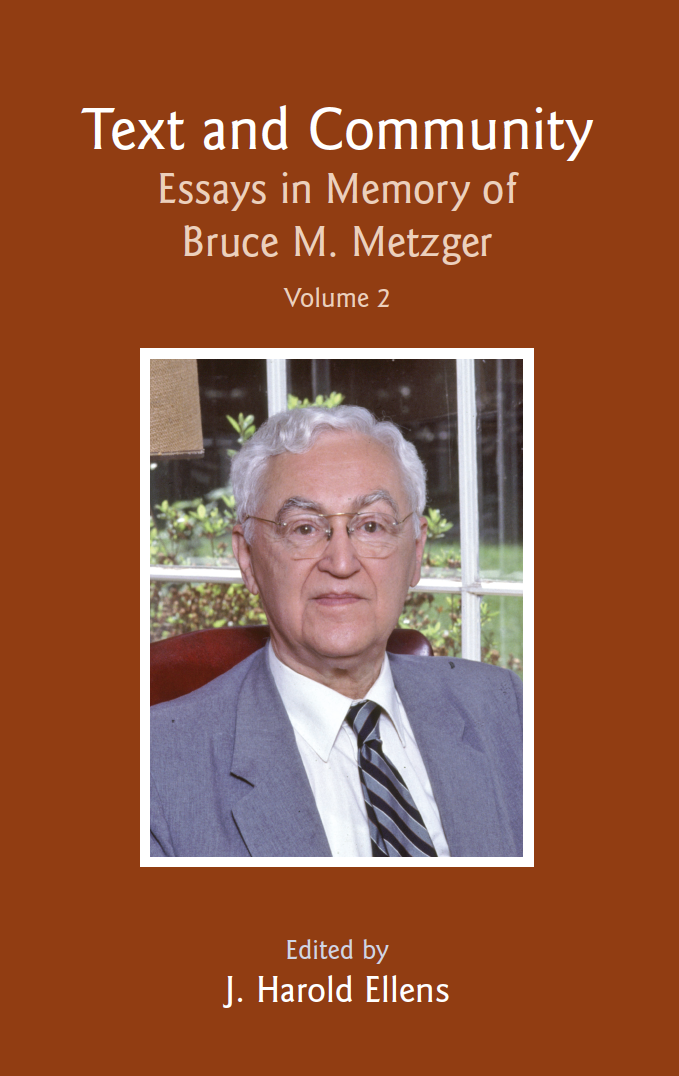
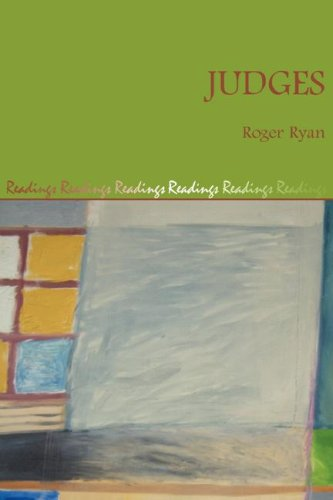
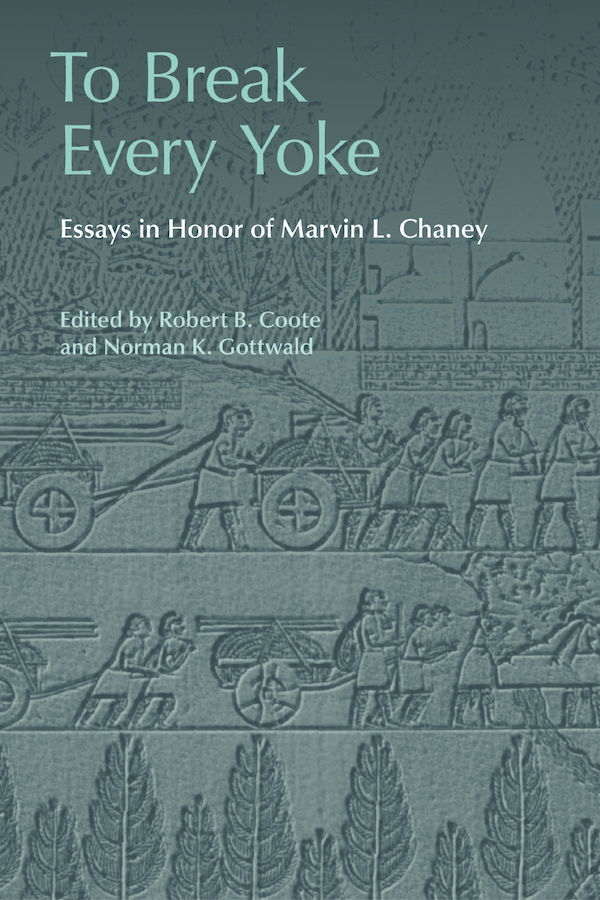
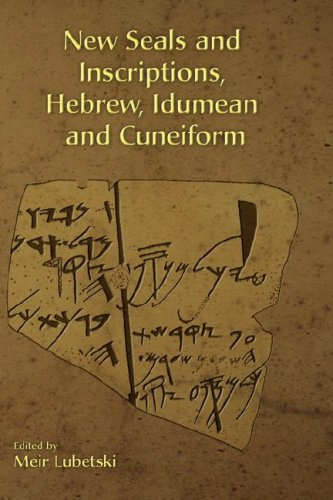
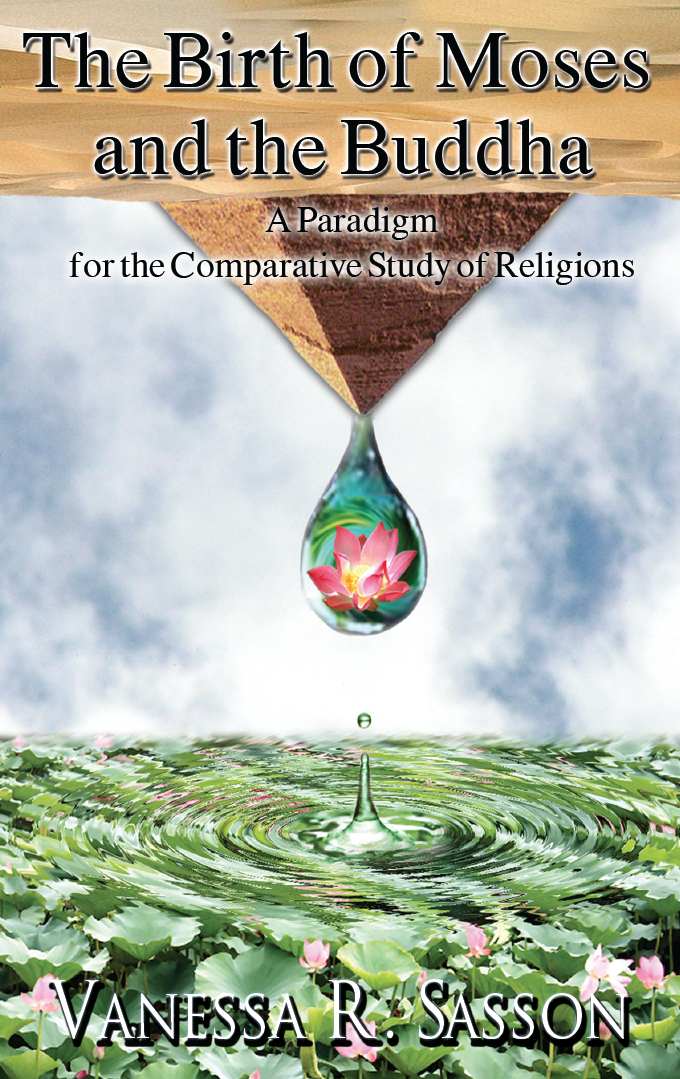
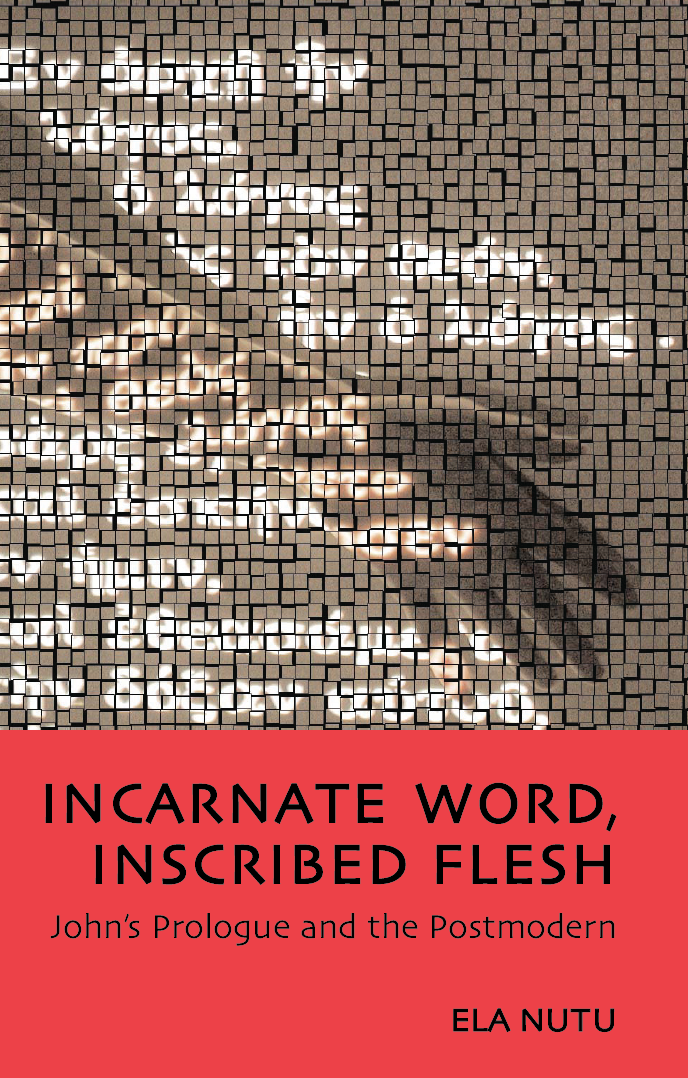

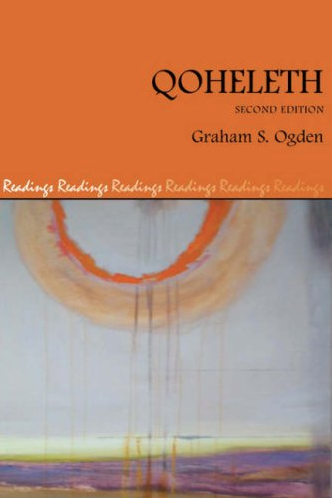
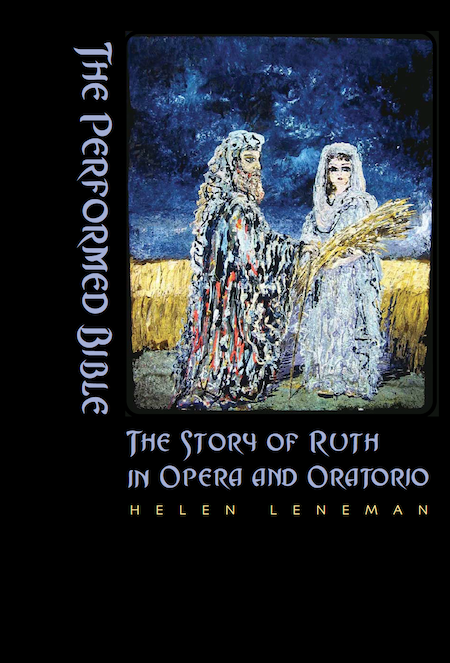
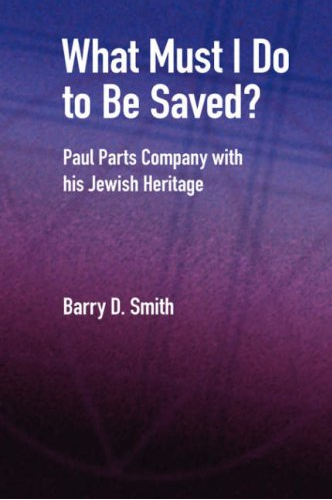
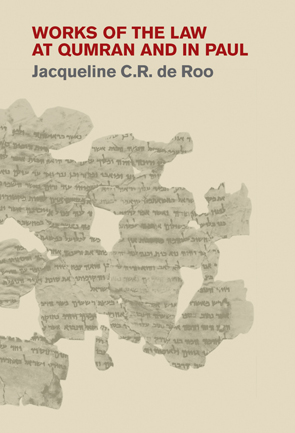


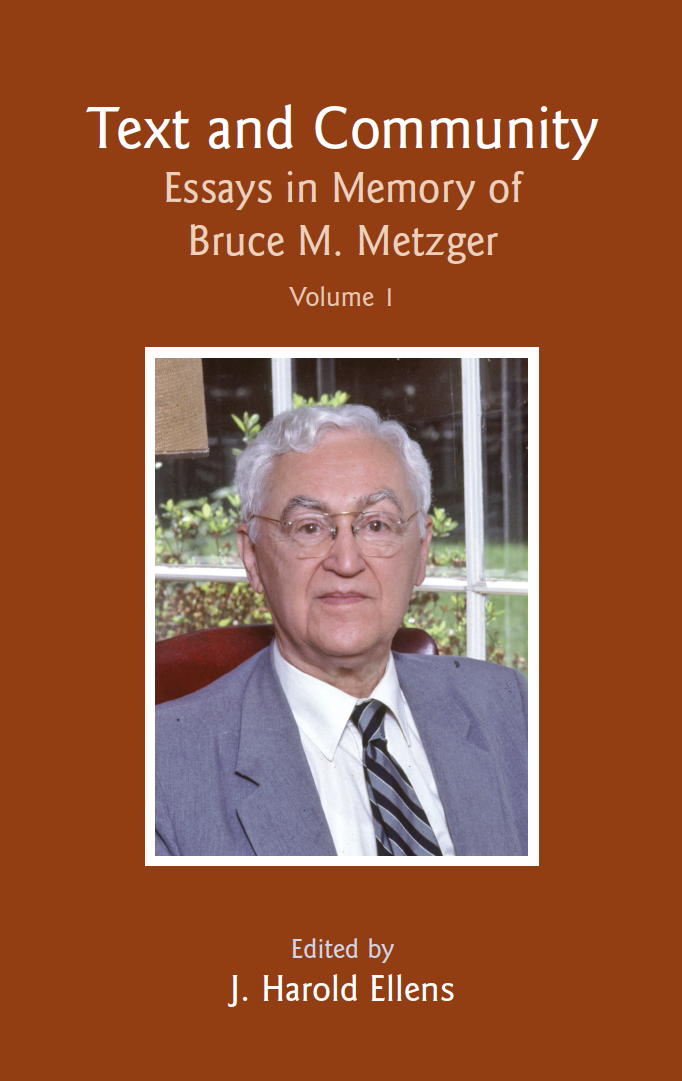
2 Chronicles
2 Chronicles